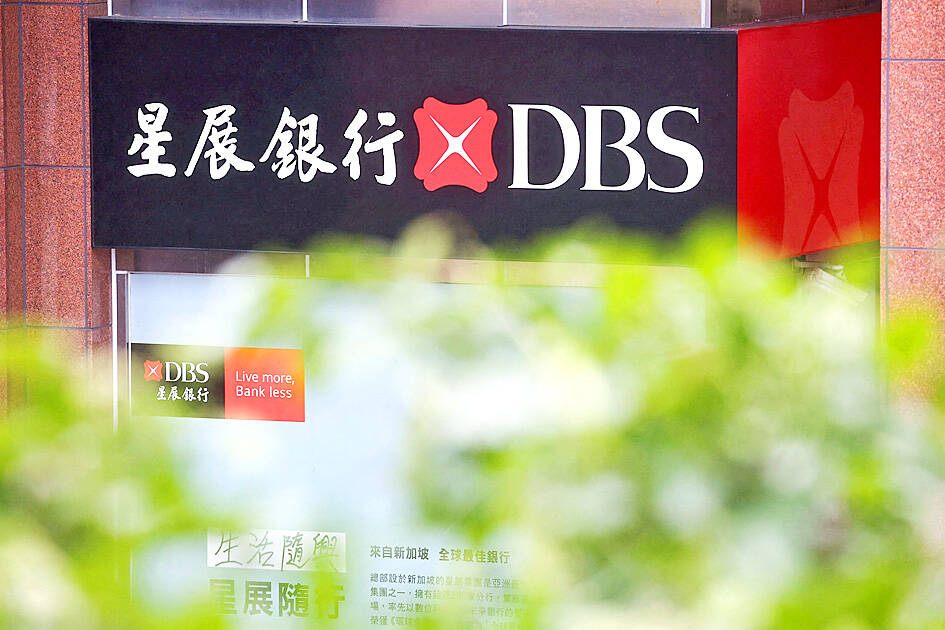DBS Group Holdings Ltd plans to cut around 4,000 of its contract and temporary staff workforce over the next three years as artificial intelligence (AI) increasingly takes on roles carried out by human beings.
Southeast Asia’s largest lender has approximately 8,000 to 9,000 of such staff, according to chief executive officer Piyush Gupta, replying to a query from Bloomberg News.
He confirmed a Press Trust of India news agency report which said the bank will trim its workforce following further adoption of AI across its business.

Photo: Ann Wang, Reuters
Permanent staff will not be affected, the outgoing CEO said. DBS, based in Singapore, has around 41,000 staff and Tan Su Shan (陳淑珊), currently deputy CEO, will succeed Gupta on March 28.
Global banks will cut as many as 200,000 jobs in the next three to five years as AI encroaches on tasks currently carried out by human workers, Bloomberg Intelligence said in a report last month.
Chief information and technology officers surveyed for Bloomberg Intelligence indicated that on average they expect a net 3 percent of their workforce to be cut, according to the report.
Still, many firms have stressed that the shift will result in roles being changed by technology, rather than replaced altogether. Teresa Heitsenrether, who oversees JPMorgan Chase & Co’s AI efforts, said in November last year that the bank’s adoption of generative AI was so far augmenting jobs.
The reduction in workforce will come from “natural attrition” as temporary and contract roles roll off over the next few years, according to a DBS spokesperson.

Anna Bhobho, a 31-year-old housewife from rural Zimbabwe, was once a silent observer in her home, excluded from financial and family decisionmaking in the deeply patriarchal society. Today, she is a driver of change in her village, thanks to an electric tricycle she owns. In many parts of rural sub-Saharan Africa, women have long been excluded from mainstream economic activities such as operating public transportation. However, three-wheelers powered by green energy are reversing that trend, offering financial opportunities and a newfound sense of importance. “My husband now looks up to me to take care of a large chunk of expenses,

SECTOR LEADER: TSMC can increase capacity by as much as 20 percent or more in the advanced node part of the foundry market by 2030, an analyst said Taiwan Semiconductor Manufacturing Co (TSMC, 台積電) is expected to lead its peers in the advanced 2-nanometer process technology, despite competition from Samsung Electronics Co and Intel Corp, TrendForce Corp analyst Joanne Chiao (喬安) said. TSMC’s sophisticated products and its large production scale are expected to allow the company to continue dominating the global 2-nanometer process market this year, Chiao said. The world’s largest contract chipmaker is scheduled to begin mass production of chips made on the 2-nanometer process in its Hsinchu fab in the second half of this year. It would also hold a ceremony on Monday next week to

TECH CLUSTER: The US company’s new office is in the Shalun Smart Green Energy Science City, a new AI industry base and cybersecurity hub in southern Taiwan US chip designer Advanced Micro Devices Inc (AMD) yesterday launched an office in Tainan’s Gueiren District (歸仁), marking a significant milestone in the development of southern Taiwan’s artificial intelligence (AI) industry, the Tainan City Government said in a statement. AMD Taiwan general manager Vincent Chern (陳民皓) presided over the opening ceremony for the company’s new office at the Shalun Smart Green Energy Science City (沙崙智慧綠能科學城), a new AI industry base and cybersecurity hub in southern Taiwan. Facilities in the new office include an information processing center, and a research and development (R&D) center, the Tainan Economic Development Bureau said. The Ministry

ADVERSARIES: The new list includes 11 entities in China and one in Taiwan, which is a local branch of Chinese cloud computing firm Inspur Group The US added dozens of entities to a trade blacklist on Tuesday, the US Department of Commerce said, in part to disrupt Beijing’s artificial intelligence (AI) and advanced computing capabilities. The action affects 80 entities from countries including China, the United Arab Emirates and Iran, with the commerce department citing their “activities contrary to US national security and foreign policy.” Those added to the “entity list” are restricted from obtaining US items and technologies without government authorization. “We will not allow adversaries to exploit American technology to bolster their own militaries and threaten American lives,” US Secretary of Commerce Howard Lutnick said. The entities